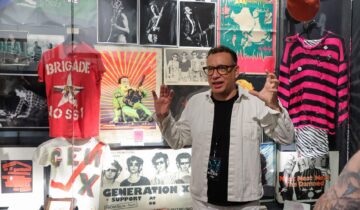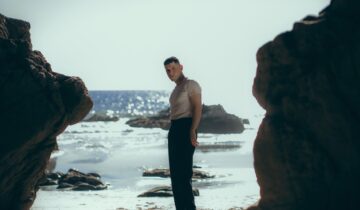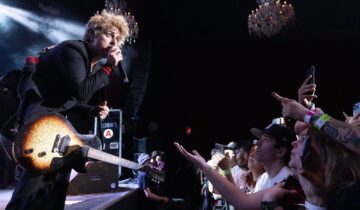 For SF WEEKLY: What is Jazz? What is “jazzy?” Those terms get tossed around a lot, but generally refer to African American music rooted in improvisation, blues, call-and-response, and swing. Beyond those basics, definitions run far and wide. Wynton Marsalis once said that jazz musicians are searching for the “freedom of ascendance.” Many “jazz” festivals don’t feature much jazz but borrow the term and its implied cultural capital anyway.
For SF WEEKLY: What is Jazz? What is “jazzy?” Those terms get tossed around a lot, but generally refer to African American music rooted in improvisation, blues, call-and-response, and swing. Beyond those basics, definitions run far and wide. Wynton Marsalis once said that jazz musicians are searching for the “freedom of ascendance.” Many “jazz” festivals don’t feature much jazz but borrow the term and its implied cultural capital anyway.
Perhaps the most famous icon of the “is it really jazz?” debate is Miles Davis, whose vast catalog of recorded music is a dizzying display of creativity and exploration that forces listeners to decide precisely what they think jazz is, or more importantly, how they prefer their jazz served up.
When Vincent Wilburn, Jr. was growing up in Chicago and learning how to play drums, his uncle, Miles Davis, would call and ask to hear him play through the phone. In the 80s, Wilburn backed “Uncle Miles” on the kit. Now, Wilburn has assembled an 11-piece band to play through the more funky side of Davis’ catalog: music he recorded in the late-60s, 70s, and 80s. The group, which includes former Davis band members from those periods, and features the Trinidad-born, Julliard-educated trumpeter Etienne Charles, plays the SFJAZZ Centre on August 23. I recently spoke with Wilburn about the upcoming performance and a new film being made about Miles Davis starring Don Cheadle.
SF Weekly: Why did you decide to perform the ’60s, ’70s, and ’80s work of your uncle, trumpeter Miles Davis?
Vincent Wilburn, Jr: There are different electric periods that Uncle Miles went through. I played with him in the 80s, some of the other guys in the band played with him in the 70s, so what we are trying to do is blend it all together. We have stories about what it was like to be with him at various times. So we talk about our experiences with Miles and then try to interpret it, and then Etienne [Charles] comes in with his own sound. It’s all like a connection. It’s a Miles connection. Everyone’s bringing in different stuff. DJ Logic never played with Miles, but he loves the music.
Not everyone likes his electric work. Some prefer the more traditional jazz side of Miles.
Yes, it can turn some people off. People who like the quintet and acoustic jazz stuff, wont like this. But if you like funky experimental stuff you will. We are serous about playing this music. Miles made music for himself. If he played Bye Bye Blackbird for 40 years, that would have been a problem. He never looked back, never rested.
What do you like most about his experimental, funky, electric music?
It all appeals to me. His work with Bird, on up to [the 1986 album] Tutu, up to Doo-Bop (his final 1992 album). Its fun when we get the guys together and we just see where the music goes, that’s exciting to me. We just go at it, and see where we take it. Nobody is trying to play like [pianist] Keith Jarrett, but we play what we play.
What was it like for you, playing with Miles in the 80s?
It was a master class in music. He told me never to take my eyes off him on stage. He would always have the tape running, and we would try things differently each night, things he wanted to change. He kept it exciting. Only he knew. It was beautiful. We thought we knew what we were going to do, but he would flip it. That’s what Uncle Miles did. It keeps the music fresh.
You’re also one of the producers of a movie about Miles Davis starring Don Cheadle. How did that come about?
I’m producing along with Darryl Porter. We were getting an award for the Rock and Roll Hall of Fame. I’m backstage, and someone says there should be a movie, and I immediately said Don Cheadle is the one. That was seven years ago. It’s not a cradle to the grave story, it’s like Ray, more like a day in the life, when he wasn’t playing in the 70s and he chose to come back. Some of it you will believe, some of it you will not. We may do a documentary as well.
How is the project coming along?
Don has been playing trumpet for three years and this is his directorial debut. The soundtrack will be from the catalog, and with Robert Glasper. Ewan McGregor is playing a Rolling Stone reporter. Ewan is a sweetheart. And Ewan is a drummer. I never knew that. Don will text me in the middle of the night. That helps us to feel more comfortable.
There are other film projects happening now about Jimi Hendrix and James Brown. Is there a growing interest in iconic African American artists?
I think it’s just a coincidence. It’s just timing. I think there are projects in the pipeline about Nina Simone and Whitney Houston also. It’s great for African Americans to pay homage to these artists. These are amazing stories. Our screenwriter also did the first draft of the James Brown film.
Do you think there’s anything specific about Miles’ music or life story that is timely and relevant again now?
Well our band just loves the music. We all get together and we all have these stories. We call Miles “the chief.” This is our way of expressing our love for the chief. The movie is long overdue. We’ve been working on this for seven years. It’s a good time for Miles and for our African American superstars who paved the way. They made a positive mark on our lives, and we just want to say thank you.
Miles Electric, with trumpeter Etienne Charles, perform at SFJAZZ on August 23
Miles Ahead is produced by Crescendo Productions along with Vince Wilburn Jr., Darryl Porter, and executive producers Erin Davis and Cheryl Davis.
Photo courtesy of SFJAZZ Center



